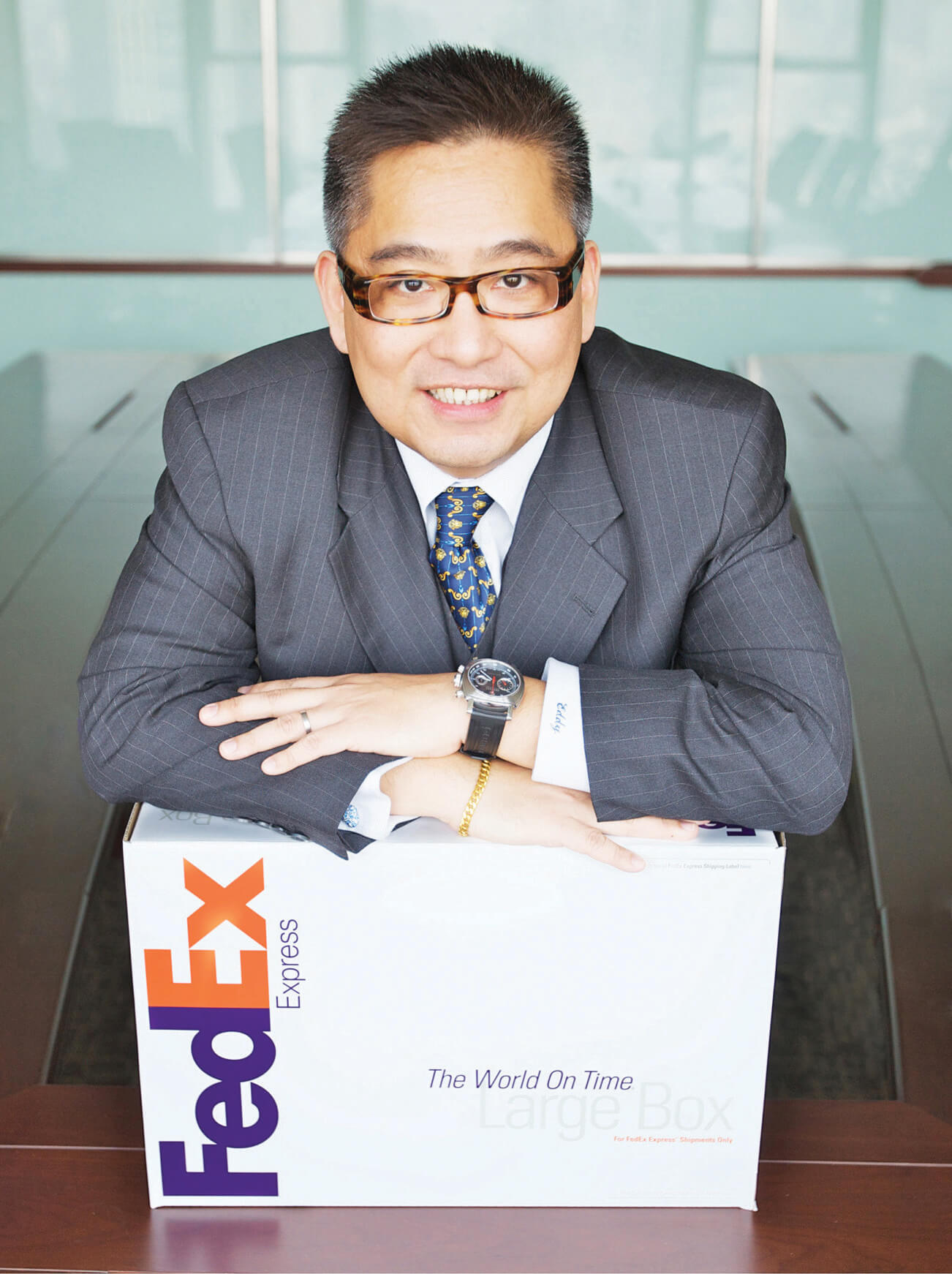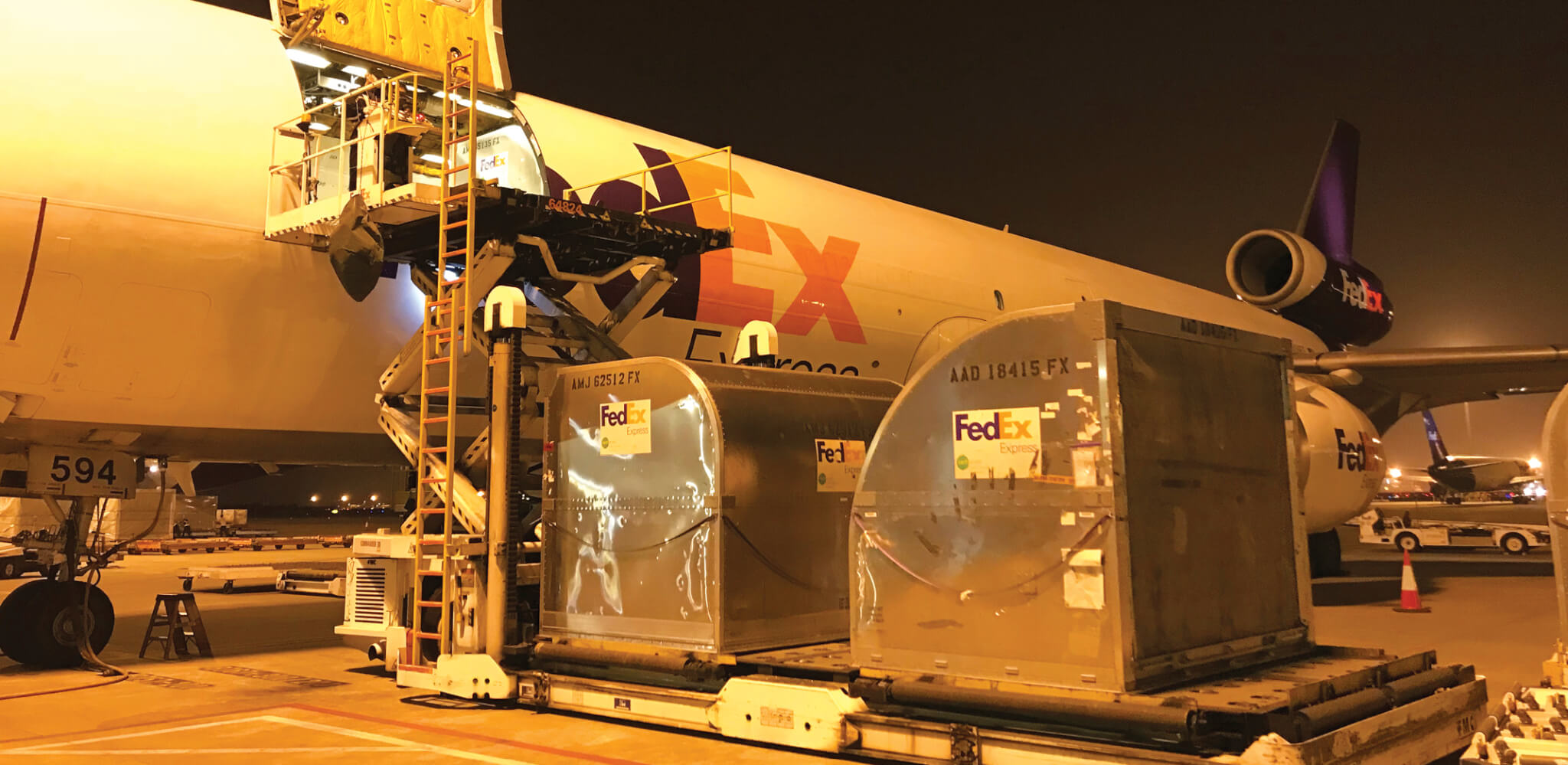Eddy Chan, President of FedEx China, explains how the Belt and Road Initiative is changing the global logistics market
Economic changes taking place in China are rippling across the world, causing rapid upheaval in global supply chains. Manufacturers are moving to lower-wage economies, the Belt and Road Initiative (BRI) is creating a new web of trade flows and the rise of cross-border e-commerce is accelerating demand for goods from across the world. And then, of course, there is a possible global trade war to factor into the equation.
Dealing with all this uncertainty requires ice-cool pragmatism, as FedEx’s China head, Eddy Chan, has learned. The Hong Kong native has worked at FedEx for most of the past 30 years, and he believes that the key to success is focusing on the firm’s three main dictums: think global, listen to your customers and always be one step ahead. In this interview, he explains how he plans to apply that philosophy in an era of unprecedented change for his industry.
Q. FedEx entered the mainland China market in 1984. How have your operations here evolved since then?
A. Our operations have gone through several phases. When we entered the market, most multinational companies were just setting up a representative office in China and doing research. Our customers needed inbound express services, so we focused on that.
Later, we spotted that China was set to become the factory of the world. So, in the mid-1990s, we became the first international express company to set up our own freight aircraft service in China. We were also the first to introduce electronic data interchange (EDI) connections, which allowed us to gain expedited customs clearance.
From 2007, when we bought back our shares from our joint venture partner and became a wholly foreign-owned enterprise, we noticed that China was becoming the center of the global supply chain. So, two years later we became the first global express company to set up our Asia-Pacific hub in Guangzhou. In 2007, we also became the first foreign firm to enter China’s domestic express market.
As time went by, we have also seen Shanghai become China’s window to the world—it has the number one ocean terminal in the world, and the third largest airport in terms of cargo handling after Hong Kong and Memphis, where FedEx’s headquarters is located. So, this year we set up our international express and cargo hub in Shanghai.
Q. How large is FedEx’s presence in China’s logistics and delivery market today
A. FedEx provides a comprehensive service to customers in China with international express and domestic express services and we also, as a cargo airline, provide space to freight forwarding companies. After the integration with TNT, a European company that we acquired in 2015, FedEx has 12,000 employees. On a weekly basis, FedEx operates around 250 flights into and out of China and we have over 3,300 vehicles.
Q. To what extent does FedEx see itself as competing with the major domestic express firms?
A. We welcome competition, no matter if it is from local companies or international companies. That’s because we believe that competition is a good way to cultivate a healthy market and that customers and industry players can benefit. But for this competition to work, there needs to be a level playing field.
I’m glad to say that the overall competitive environment in China is developing healthily, governments are in general treating us [express firms] more or less the same. We are not asking for preferential treatment. What we’re asking for is fair competition.
Q. FedEx Express has said it expects the Belt and Road Initiative to boost demand for its services. What opportunities is the BRI opening up for you?
A. We think that the Belt and Road Initiative is crucial for global supply chains. The value of China’s imports and exports to and from the Belt and Road countries reached RMB 7.4 trillion ($1.05 trillion) in 2017, up 17.8% year-on-year. We have made some strategic decisions because of this.
First, we recently acquired some companies in Eastern Europe and South Africa. We are doing this because it will allow us to strengthen our position along the Belt and Road. Second, we have also launched direct flights from Guangzhou to Hanoi, Mumbai, Delhi and other key Belt and Road cities. Also, our acquisition of TNT in 2015 has allowed us to strengthen our operations in Europe. The Belt and Road linking China to Europe is important.
Q. E-commerce deliveries in China are forecast to reach nearly 50 billion this year. How much growth is left in this market?
A. We should not only look domestically, but focus more on cross-border e-commerce. I’ll give you some numbers. Asia-Pacific as a whole remains the world’s largest e-commerce market with sales expected to more than double to $2.7 trillion by 2020. China plays an important role in this, so for me this is just the beginning.
We are very much focused on the e-commerce business. We have formed a new e-commerce division in the US. At the beginning of this year, we acquired some e-commerce transportation companies, including a UK company called P2P, in order to further strengthen our e-commerce capability. And in the US, we have made acquisitions in a lot of industries related to e-commerce, such as fulfillment and retail logistics.
Q. How large an increase in cross-border shipments do you expect to see?
A. What we expect to see more of is imports of goods to China under the e-commerce umbrella. Actually, the Chinese government is promoting this. Many Chinese tourists go abroad, buy stuff and come back. They are doing that because a lot of goods are cheaper overseas. But if the government sets up a good platform and allows Chinese citizens to buy these goods in a legitimate manner, then they could buy goods from all over the world without going overseas. So, they can buy the goods cheaply, and on the other hand, they have quite a lot of disposable income, which can be spent locally. For me, that’s a win-win and that will be the trend going forward.
Q. China’s logistics industry is automating rapidly with firms experimenting with unmanned warehouses and drone delivery. What are FedEx’s plans?
A. We make use of drones not only for package delivery, but also for checking our facilities and our aircraft. We use artificial intelligence to analyze data so that during the peak season we know how to plan our routes and allocate our aircraft and resources. We are also exploring the technology of “platooning,” which allows us to manage our fleet of trucks and monitor fuel usage, safety and efficiency more effectively. The big hot topic at the moment is blockchain. FedEx is a charter member of the Blockchain in Transport Alliance, as well as the Blockchain Research Institute. FedEx Freight, our subsidiary company, has a pilot project underway that uses blockchain technology to share shipment information among suppliers, FedEx and retailers.
Q. FedEx recently opened a large hub in Shanghai. What advantages will that bring?
A. The hub is the largest cargo facility of its kind in Pudong, the industrial center in eastern Shanghai. There is over 100,000 square meters of warehouse space and the sorting capacity is around 36,000 packages per hour. It also includes temperature control and a customs clearance facility. Since we opened the hub, we have added quite a lot of round-the-world flights.
Because Shanghai is the window to China, and because of the economic opportunities in the Yangtze River Delta (YRD) area that surrounds the city, it’s important to us. We have a large operation in the YRD area and it also helps us take advantage of the recently integrated customs clearance process. We can now fly from northern or western China to Shanghai. Because of that, we can fully utilize our flight network in China.
Q. Chinese logistics firms are looking to expand into overseas markets. To what extent will this pose a challenge to FedEx?
A. These big companies in China logically will not be satisfied with only serving the domestic market. They will expand overseas. So, that is something that we already anticipated, and we take it into consideration for our overall strategic development. We welcome competition and we can’t stop other companies from doing what they are doing. We can only control our own destiny.
Because of this, we are focusing on our long-term strategies. First, we are expanding our global network because our business is a network business. Second, we’re broadening our range of services to meet different customer requirements. That’s the reason why we are focusing on e-commerce and supply chain. Third, we are focusing on technological deployment as a way to enhance our efficiency and provide better services.
At the end of the day, I think good execution is the most important thing, and our people play an important role. The secret of our success in execution is to make sure that we treat our people well, provide a good environment for them to develop and give them opportunities. Most importantly, we want their success to be linked to the success of the company. We want to emphasize that—we’re here for the long term; we want to do the right thing. So, following the rules is very important.
Q. The US-China relationship appears to be entering a new phase. To what extent does this context impact FedEx’s operations in China and its plans for the future?
A. Overall, I’m cautiously optimistic. Why? Because the US is the largest economy in the world; China is the second-largest. Instead of having conflict, personally I see that they are more complementary with each other and rely on each other. I think any conflicts will be resolved in a satisfactory manner because both governments are responsible for the well-being of their people. Fighting with each other will not address the issues.
FedEx cannot control the macroeconomic environment. I keep on telling my people that we need to monitor and understand the macro environment, but we can’t control it. So, I would rather focus on the opportunity side. If we are pessimistic, we will not win.
The opportunities I see are how FedEx can benefit from Made in China 2025. Under Made in China 2025, a lot of advanced technological products will be produced in China and then they will need an express service. We can take advantage of the opportunities from the Belt and Road Initiative. We can focus on how we can support SMEs and e-commerce, because the government wants to do the right thing and express companies can work with them to address this. So, I think that with our global network, strong footprint in China and good customer service, in the long run we will benefit from economic prosperity here in China.






















